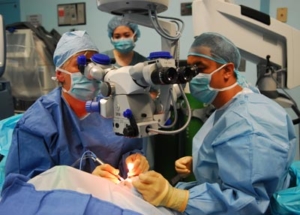What Are Cataracts?
 A cataract is a clouding of the lens of the eye which adversely affects a person’s vision. Generally speaking, cataracts are seen primarily in older people, and, in fact, by age 80, more than half of all Americans have either had surgery to correct a cataract, or have an uncorrected cataract. While a cataract can occur in either or both eyes, it is not “contagious,” and cannot spread from one eye to the other.
A cataract is a clouding of the lens of the eye which adversely affects a person’s vision. Generally speaking, cataracts are seen primarily in older people, and, in fact, by age 80, more than half of all Americans have either had surgery to correct a cataract, or have an uncorrected cataract. While a cataract can occur in either or both eyes, it is not “contagious,” and cannot spread from one eye to the other.
In order for the retina of the eye to receive a sharp image, the lens must be clear, rather than cloudy. Cataracts are caused by proteins which clump together and cloud the lens. The lens is primarily made up of protein and water; however, the protein is arranged in such a way that a lens without a cataract is clear, allowing light to pass through to the retina.
Causes and Symptoms of Cataracts
While there are no definitive causes of cataracts, other than aging, some research points to smoking and diabetes as facilitators of cataracts. Additionally, those who have had prolonged exposure to ultraviolet sunlight may be more prone to developing cataracts. Those with cataracts will generally experience cloudy vision, perhaps first only in the small part of the lens which is affected. Many people don’t really notice the early signs of a cataract, as the eyes tend to compensate for the small blur.
 As the cataract grows, however, blurry vision may begin to be noticeable. Another symptom of a cataract is a lens which changes from clear to yellowish-brown, resulting in a brownish tint to the affected person’s vision. Those who have color changes in the lens may be unable to identify blues and purples, and may think a black suit is purple. If you notice cloudy vision, double vision, multiple images in one eye, poor night vision, a “halo” which appears around lights, or you have frequent prescription changes in your eyeglasses, you could be experiencing the early stages of cataract formation.
As the cataract grows, however, blurry vision may begin to be noticeable. Another symptom of a cataract is a lens which changes from clear to yellowish-brown, resulting in a brownish tint to the affected person’s vision. Those who have color changes in the lens may be unable to identify blues and purples, and may think a black suit is purple. If you notice cloudy vision, double vision, multiple images in one eye, poor night vision, a “halo” which appears around lights, or you have frequent prescription changes in your eyeglasses, you could be experiencing the early stages of cataract formation.
Risks Associated with Cataract Surgery
Although cataract surgery is one of the most common surgical procedures performed in the U.S., and is generally considered safe, there are always risks associated with any surgical procedure. The risks associated with cataract surgery include the following:
- Infection;
- Excess bleeding;
- Retinal detachment;
- Inflammation;
- Swelling;
- Drooping of the eyelid;
- Glaucoma;
- Vision loss;
- High or low eye pressure;
- Redness;
- Secondary or “after” cataract; and
- Dislocation of the newly–implanted artificial lens.
Medical Malpractice Before, During, or After Cataract Surgery
While you may have experienced an unexpected outcome, medical malpractice only occurs when your ophthalmologist failed to provide treatment which was in conformance with the accepted medical standard of care for such a surgical procedure. An acceptable medical standard of care is one that a reasonably competent ophthalmologist would have provided under the same circumstances. Medical malpractice before the cataract surgery could relate to lack of informed consent, or false or deceptive advertising which promised things the doctor could not reasonably deliver.
Medical malpractice after the cataract surgery could relate to the surgeon failing to provide proper instructions on how to care for the eyes post-operatively. Medical malpractice requires a clear demonstration of negligence or substandard care, which resulted in harm. There must also be a doctor-patient relationship, a breach of the duty of reasonable care (i.e., a negligent act) and injuries related to the negligent act. If you suffered harm from your cataract surgery in the form of significantly worse vision, you could benefit from speaking to an experienced medical malpractice attorney. Your attorney can help you determine whether you experienced medical malpractice, as well as the best way to proceed.
Contact The Experienced Medical Malpractice Lawyers Near Me
If you or someone you love has been injured after undergoing a cataract surgical procedure, the medical malpractice attorneys at McLaughlin & Lauricella, P.C., can help. Our team of lawyers consists of some of the best medical malpractice attorneys in Pennsylvania and New Jersey, and we will fight aggressively for you throughout the legal process.
The medical malpractice attorneys at McLaughlin & Lauricella, P.C., have more than 90 years of experience representing patients and their families across Philadelphia, Berks, Bucks, Dauphin, Delaware, Lackawanna, Lehigh, Luzerne, Montgomery, and Northampton Counties. We are also proud to serve injured patients throughout the State of New Jersey. Contact us today toll-free at 1-855-633-6251 or fill out our confidential contact form to learn more about your legal options.



